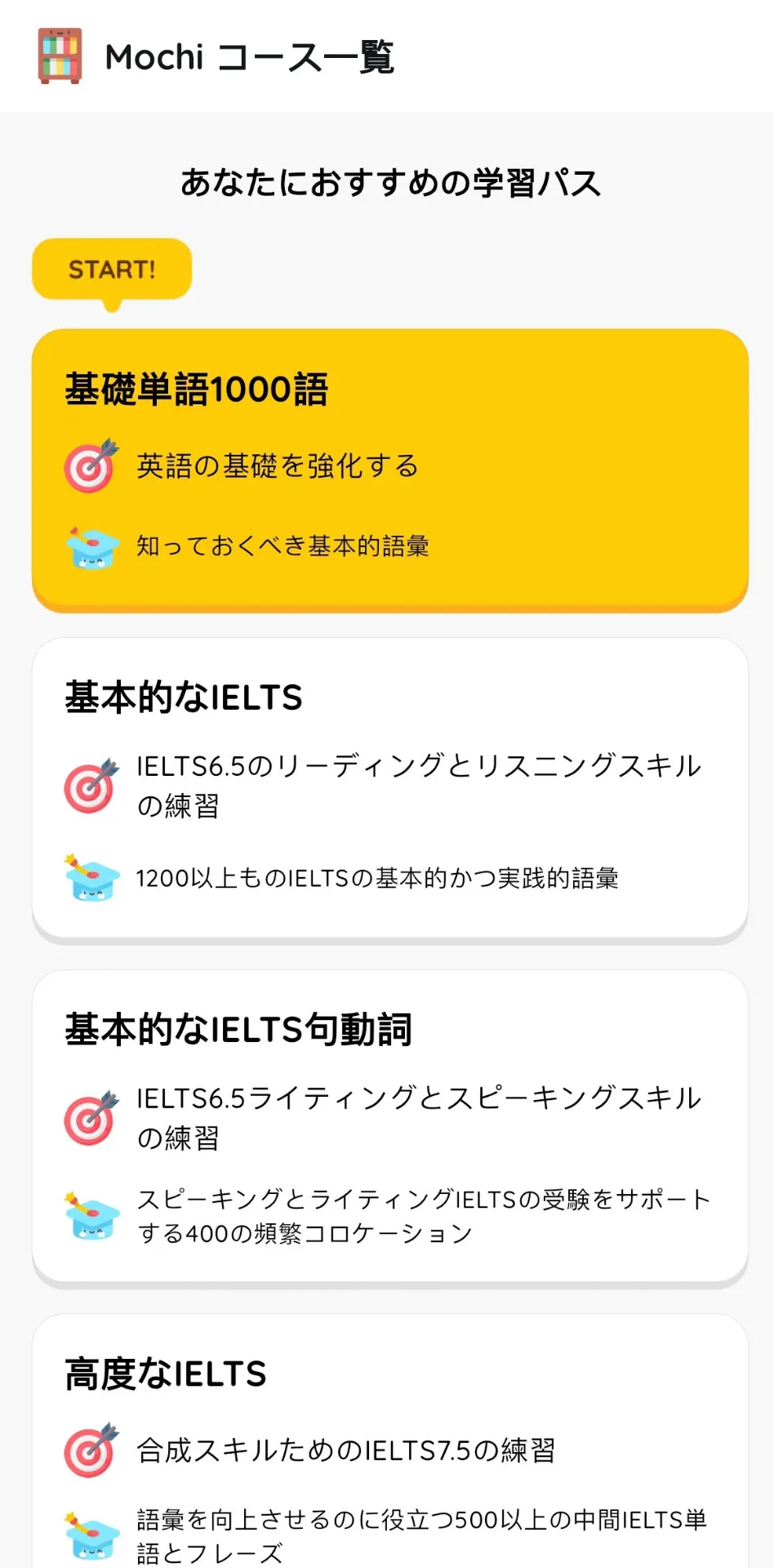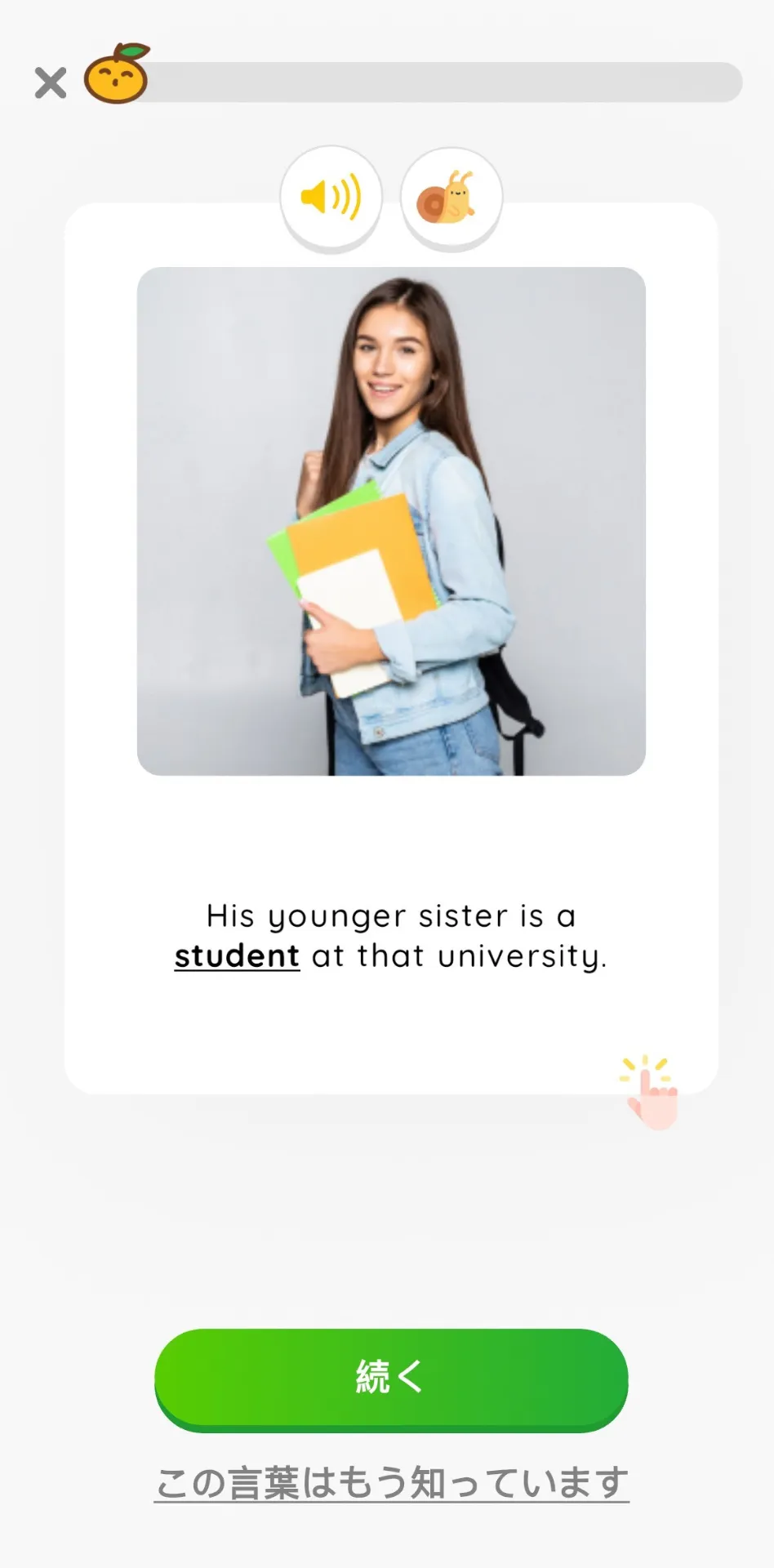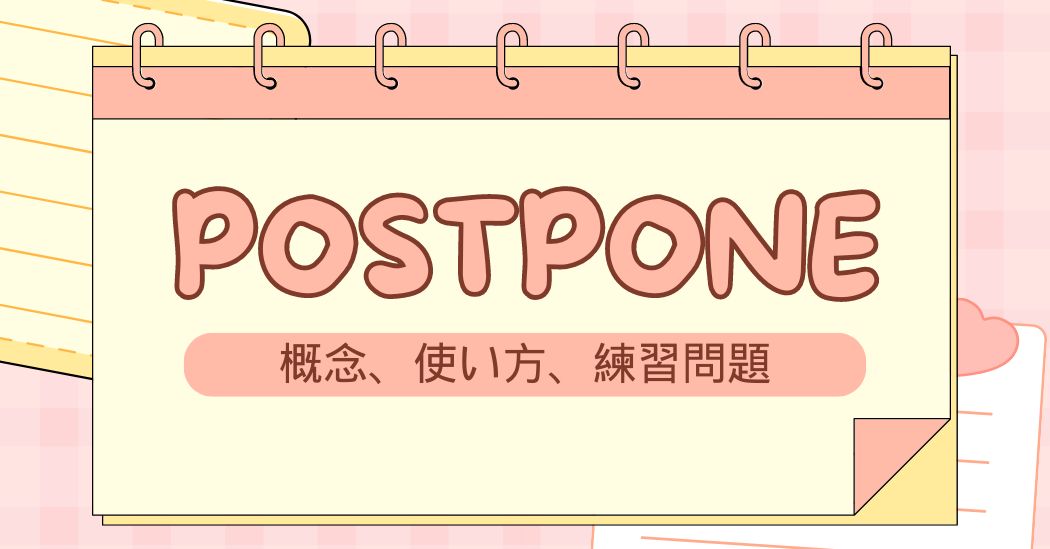英語の導入語句やフレーズは、リンクワード (linking words) としても知られており、文章や段落をつなげるために使われます。この記事では、MochiMochiと一緒に英語の一般的な導入語句やフレーズを学んでみましょう!
I. 英語の導入語句やフレーズとは?
英語の導入語句やフレーズ (phrases with word leading/linking words) とは、文章や段落をつなげ、論理的な流れを作るために使われる単語やフレーズのことです。
これらの導入語句やフレーズは、文章やスピーチ、会話を論理的で一貫性のあるものにする重要な役割を果たします。また、エッセイやプレゼンテーションをより生き生きとしたものにすることもできます。
II. 一般的な英語の導入語句やフレーズ
シンプルなリンクワードを繰り返し使う代わりに、さまざまな導入語句を使用することで、文章やスピーチをより印象的にすることができます。機能や使い方に応じて、英語の導入語句やフレーズは以下のように分類できます:
1. 説明や強調を表す導入語句やフレーズ
問題を強調したり、確認したり、より明確にする必要があるときには、以下の導入語句やフレーズを使用します:
| 単語/フレーズ | 意味 | 例文 |
|---|---|---|
| In order to | ~するために | In order to pass the exam, I need to study hard. (試験に合格するために、一生懸命勉強する必要があります。) |
| In other words | 言い換えれば | He is very tall. In other words, he is a giant. (彼はとても背が高い。つまり、彼は巨人です。) |
| To put it another way | 言い換えると | She solves the math problem very quickly. To put it another way, she is very smart. (彼女は数学の問題をすぐに解きます。言い換えると、彼女はとても賢いです。) |
| That is to say | つまり、詳しく言えば | He is a vegetarian, that is to say, he doesn’t eat meat. (彼はベジタリアンです。つまり、彼は肉を食べません。) |
| Truthfully | 正直に言うと | Truthfully, I don’t like horror movies. (正直に言うと、ホラー映画は好きではありません。) |
| As far as I know | 私の知る限りでは | As far as I know, the meeting is canceled. (私の知る限り、その会議はキャンセルされました。) |
| As you are all aware | 皆さんがご存知のように | As you are all aware, this project is very important. (皆さんがご存知のように、このプロジェクトは非常に重要です。) |
| Not to mention | 言うまでもなく | The food was delicious, not to mention the beautiful view. (食べ物は美味しかったし、美しい景色も言うまでもなく素晴らしかった。) |
| It is worth mentioning that | ~ということは言うまでもなく | It is worth mentioning that he always arrives late. (彼がいつも遅刻することは言うまでもありません。) |
| Undoubtedly | 疑いなく、確かに | Undoubtedly, she is the best singer in the world. (疑いなく、彼女は世界最高の歌手です。) |
| Indeed | 実際に、確かに | The movie was very good. Indeed, it was one of the best I’ve ever seen. (その映画は非常に良かった。確かに、それは私が今まで見た中で最高の映画の一つでした。) |
| Obviously | 明らかに | Obviously, you need to study hard if you want to pass the exam. (明らかに、試験に合格したいなら一生懸命勉強する必要があります。) |
| Generally | 一般的に | Generally, people are afraid of spiders. (一般的に、人々はクモを恐れます。) |
| Admittedly | 認めざるを得ないことに | Admittedly, I was wrong to lose my temper. (認めざるを得ないが、私が感情を抑えきれなかったのは間違いでした。) |
| In fact | 実際には | I thought the restaurant was expensive, but in fact, the prices were quite reasonable. (そのレストランは高いと思っていましたが、実際には価格はかなり合理的でした。) |
| Particularly/In particular | 特に | I like all kinds of music, particularly classical music. (私はあらゆる種類の音楽が好きですが、特にクラシック音楽が好きです。) |
| Especially | 特に | I’m tired, especially after that long walk. (私は疲れています。特にその長い散歩の後では。) |
| Importantly | 重要なのは | Importantly, we need to focus on finding a solution to this problem. (重要なのは、この問題の解決策を見つけることに集中する必要があるということです。) |
| Surprisingly | 驚くべきことに | Surprisingly, she decided to quit her job. (驚くべきことに、彼女は仕事を辞めることを決めました。) |
2. 類似や補足を表す導入語句やフレーズ
ある意見や問題を明確にしたり、情報を補足したりする際には、次の単語やフレーズを使用します:
| 単語/フレーズ | 意味 | 例文 |
|---|---|---|
| Moreover/Furthermore | さらに | I like to read books. Moreover, I enjoy listening to music. (私は本を読むのが好きです。さらに、音楽を聴くのも好きです。) |
| What’s more | さらに | The food was delicious. What’s more, the service was excellent. (食べ物は美味しかった。さらに、サービスも素晴らしかった。) |
| Similarly/Likewise | 同様に | She loves to travel. Similarly, I enjoy exploring new places. (彼女は旅行が大好きです。同様に、私は新しい場所を探検するのが好きです。) |
| As mentioned previously | 先に述べたように | As mentioned previously, the project deadline is next Friday. (先に述べたように、プロジェクトの締め切りは次の金曜日です。) |
| In addition to | ~に加えて | In addition to English, she speaks French and Spanish. (英語に加えて、彼女はフランス語とスペイン語も話します。) |
| Besides | ~に加えて、さらに | Besides being a teacher, she is also a talented musician. (彼女は教師であるだけでなく、才能のあるミュージシャンでもあります。) |
| Another key thing to remember | もう一つ覚えておくべき重要なこと | Another key thing to remember is to back up your data regularly. (もう一つ覚えておくべき重要なことは、データを定期的にバックアップすることです。) |
| It is worth noting that | 注意すべきは | It is worth noting that the theater is closed on Mondays. (注意すべきは、その劇場は月曜日に閉館していることです。) |
| Not only… but also | ~だけでなく…も | Not only is she intelligent but also beautiful. (彼女は知的であるだけでなく、美しいです。) |
| Likewise | 同様に | I like apples. Likewise, my sister likes pears. (私はリンゴが好きです。同様に、妹はナシが好きです。) |
| Also | さらに | I like to read books. Also, I enjoy watching movies. (私は本を読むのが好きです。さらに、映画を見るのも楽しんでいます。) |
| Like | ~のように | She can speak many languages, like English, French, and Spanish. (彼女は英語、フランス語、スペイン語など多くの言語を話すことができます。) |
| Just as/Just like | ちょうど…のように | Just like a flower needs sunlight to grow, so does a child need love. (花が成長するために太陽の光を必要とするように、子供も愛を必要とします。) |
| Similar to/Same as | ~と同様に | Similar to my sister, I’m a fan of Maroon 5. (姉と同様に、私はMaroon 5のファンです。) |
| Compare(d) to/with | ~と比較して | Compared to other cities, Hanoi is very crowded. (他の都市と比べて、ハノイは非常に混雑しています。) |
3. 列挙や順序を表す導入語句やフレーズ
英語の文章、特に階層的な内容が必要なエッセイでは、これらの導入語句やフレーズを使うことで、文章をより論理的に整えられます:
| 単語/フレーズ | 意味 | 例文 |
|---|---|---|
| First | 最初に | First, I woke up. |
| Then | 次に | Then, I had breakfast. |
| Finally | 最後に | Finally, I went to work. (最初に起きて、それから朝食をとり、最後に仕事に行きました。) |
| Firstly, secondly, thirdly | 第一に、第二に、第三に | Firstly, I like pizza because it’s delicious. Secondly, it’s easy to make. Thirdly, it’s a great dish to share with friends. (まず、ピザが好きなのはおいしいからです。次に、作るのが簡単です。最後に、友達と分かち合うには最高の料理です。) |
| Of the two types of production methods mentioned | 言及された2種類の生産方法の中で | Of the two types of production methods mentioned, mass production is generally more cost-effective. (言及された2つの生産方法の中で、量産は一般的にコスト効果が高いです。) |
4. 対立を表す導入語句やフレーズ
「but」(しかし)以外にも、以下のような英語の導入語句やフレーズを使用して、対立する意見を表現できます:
| 単語/フレーズ | 意味 | 例文 |
|---|---|---|
| However | しかしながら | She is a good student, however, she is shy. (彼女は良い学生ですが、しかしながら、彼女は内気です。) |
| On the other hand | その一方で | I like coffee in the morning. On the other hand, I prefer tea in the afternoon. (私は朝にコーヒーが好きです。その一方で、午後にはお茶が好きです。) |
| By contrast | 対照的に | Cats are independent animals. By contrast, dogs are often very loyal. (猫は独立した動物です。対照的に、犬は非常に忠実であることが多いです。) |
| In comparison | 比較して | In comparison to other cities, Hanoi is quite peaceful. (他の都市と比べて、ハノイはかなり平和です。) |
| Although/Despite this | ~にもかかわらず | Although she is rich, she is not happy. (彼女は裕福ですが、幸せではありません。) |
| With this in mind | これを念頭に置いて | With this in mind, we should invest more in education. (これを念頭に置いて、教育にもっと投資すべきです。) |
| Provided/Providing that | ~という条件で | You can borrow my car provided that you return it on time. (時間通りに返すという条件で、私の車を借りることができます。) |
| In view of/In light of | ~を考慮して | In view of the bad weather, the picnic has been canceled. (悪天候を考慮して、ピクニックは中止されました。) |
| Nevertheless/Nonetheless | それにもかかわらず | She tried hard to lose weight, but nevertheless she didn’t succeed. (彼女は体重を減らすために努力しましたが、それにもかかわらず、成功しませんでした。) |
| Meanwhile/While | その間に | I was doing my homework. Meanwhile, my sister was watching TV. (私は宿題をしていました。その間、妹はテレビを見ていました。) |
| Still | それでも | I tried to finish my work early, but I still didn’t have enough time. (早く仕事を終わらせようとしましたが、それでも時間が足りませんでした。) |
| Although/Even though/Though/But/Yet/Despite/In spite of | ~にもかかわらず | Although it was raining, we went for a walk. (雨が降っていたにもかかわらず、私たちは散歩に出かけました。) |
| In contrast (to)/In comparison | 対照的に、比較して | In contrast to my brother, I am very outgoing. (兄とは対照的に、私はとても社交的です。) |
| Whereas | ~に対して | Whereas John loves to play football, Mary prefers to read books. (ジョンがサッカーをするのが好きなのに対して、メアリーは本を読むのが好きです。) |
| On the contrary | 逆に | I thought the movie was boring. On the contrary, my friend loved it. (私はその映画が退屈だと思いました。逆に、友達はそれを愛していました。) |
5. 因果関係を表す導入語句やフレーズ
因果関係を表す文章やエッセイで重要な役割を果たすのが以下の導入語句やフレーズです:
| 単語/フレーズ | 意味 | 例文 |
|---|---|---|
| Therefore | それゆえに | It’s raining heavily. Therefore, we can’t go out. (雨が激しく降っています。それゆえに、外出できません。) |
| Consequently | 結果として | She didn’t study hard. Consequently, she failed the exam. (彼女は一生懸命勉強しませんでした。結果として、彼女は試験に失敗しました。) |
| As a result | その結果 | The company made a lot of mistakes. As a result, it went bankrupt. (その会社は多くのミスを犯しました。その結果、破産しました。) |
| Because/Since/Due to | ~のために、~だから | Because it was a holiday, we decided to go to the beach. (祝日だったため、私たちはビーチに行くことにしました。) |
6. 例や統計を示す導入語句やフレーズ
数字や例を示す際には、次の導入語句を使って文章をより豊かにします:
| 単語/フレーズ | 意味 | 例文 |
|---|---|---|
| For example/For instance | 例えば | There are many tourist attractions in Vietnam. For instance, Ha Long Bay is a UNESCO World Heritage Site. (ベトナムには多くの観光地があります。例えば、ハロン湾はユネスコの世界遺産です。) |
| To give an illustration/To illustrate | 説明するために | To give an illustration of the concept, let’s consider the case of water pollution. (この概念を説明するために、水質汚染のケースを考えてみましょう。) |
| Including | ~を含めて | Many fruits, including apples, bananas, and oranges, are good sources of vitamin C. (リンゴ、バナナ、オレンジなど、多くの果物がビタミンCの良い供給源です。) |
| Namely | すなわち | There are three main types of clouds, namely cirrus, stratus, and cumulus. (主な雲のタイプは3つあります。すなわち、巻雲、層雲、積雲です。) |
| According to statistics/According to survey data | 統計によると | According to survey data, most people prefer to work from home. (調査データによると、ほとんどの人が在宅勤務を好みます。) |
| To demonstrate | 示すために | To demonstrate the effectiveness of this new drug, we conducted a series of clinical trials. (この新薬の効果を示すために、一連の臨床試験を行いました。) |
| Take the case of | ~の場合を考えてみる | Take the case of social media, it has revolutionized the way we communicate and connect with others. (ソーシャルメディアの場合を考えてみると、それは私たちが他者とコミュニケーションし、つながる方法を革命的に変えました。) |
| Such as | ~のような | I like many fruits, such as apples, bananas, and oranges. (私はリンゴ、バナナ、オレンジなど多くの果物が好きです。) |
7. 結論を示す導入語句やフレーズ
文章を締めくくる際には、次の導入語句を使用します:
| 単語/フレーズ | 意味 | 例文 |
|---|---|---|
| In conclusion | 結論として | In conclusion, I believe that climate change is the most pressing issue facing our planet today. (結論として、気候変動は今日、私たちの地球が直面している最も緊急の問題であると信じています。) |
| Above all | 何よりも | Above all, education is the key to success. (何よりも、教育は成功の鍵です。) |
| To sum up | 要約すると | To sum up, the benefits of learning a foreign language outweigh the challenges. (要約すると、外国語学習の利点は課題を上回ります。) |
| In short | 要するに | In short, smoking is harmful to your health. (要するに、喫煙は健康に有害です。) |
| The main point is that | 重要なのは | The main point is that technology has had a significant impact on our lives. (重要なのは、テクノロジーが私たちの生活に大きな影響を与えているということです。) |
| Most importantly | 最も重要なのは | Most importantly, we need to protect our environment for future generations. (最も重要なのは、未来の世代のために私たちの環境を守る必要があるということです。) |
| So/Therefore/Thus/Hence | したがって、それゆえに | It was raining heavily, so I decided to stay at home. (雨が激しく降っていたので、家にいることに決めました。) |
| As a result/As a consequence (of) | その結果 | She studied hard, and as a result, she got excellent grades. (彼女は一生懸命勉強し、その結果、素晴らしい成績を収めました。) |
| Consequently | 結果として | The company lost a lot of money. Consequently, they had to lay off some employees. (その会社は多額の損失を出し、その結果、一部の従業員を解雇しなければなりませんでした。) |
| Due to | ~のために | Due to bad weather, the flight was delayed. (悪天候のため、フライトが遅れました。) |
| In brief | 簡潔に言えば | In brief, the project was a success. (簡潔に言えば、このプロジェクトは成功しました。) |
| On the whole | 全体的に見て | On the whole, I enjoyed the movie. (全体的に見て、その映画を楽しめました。) |
| As I have shown | 示したように | As I have shown, smoking is harmful to health. (示したように、喫煙は健康に害を与えます。) |
| As a rule | 原則として | As a rule, I wake up at 6 am. (原則として、私は午前6時に起きます。) |
| For the most part | 大部分 | For the most part, students enjoy their summer vacations. (大部分の学生は夏休みを楽しんでいます。) |
| Generally/In general | 一般的に | Generally, people are afraid of spiders. (一般的に、人々はクモを恐れます。) |
| Overall | 全体的に | Overall, the team performed well. (全体的に見て、チームはよくやりました。) |
| In most cases | 大抵の場合 | In most cases, children like to play games. (大抵の場合、子供たちはゲームをするのが好きです。) |
英語の導入語句やフレーズは、文章やスピーチをより一貫性があり、論理的にするために重要な役割を果たします。さらに、これらのフレーズは、エッセイやプレゼンテーションをより生き生きとさせる効果もあります。これらの導入語句やフレーズを適切に使用することで、文章やスピーチが読み手や聞き手にとって、より自然で理解しやすいものになります。
MochiVocabアプリでは、英語の導入語句やフレーズをさらに深く学ぶことができます。MochiVocabは、多くの語彙をさまざまなトピックに分けて提供しており、フラッシュカード形式での学習が可能です。これには、単語の定義、発音記号、音声、そして例文が含まれています。
さらに、MochiVocabは、スペースリピティション(間隔をあけた復習)技術を活用しており、「ゴールデンタイム」機能を通じて、最適なタイミングで復習を行うことで、効果的に単語を記憶することができます。
学習した単語は、記憶レベルに応じて5つの段階に分類されており、新しい単語から深く記憶された単語まで、各レベルに合わせた復習が自動的にスケジュールされます。これにより、効率的に語彙力を向上させることができます。



以上のことから、英語の導入語句やフレーズは、スピーチや文章をより一貫性のあるものにし、より魅力的にするために不可欠な要素です。この記事が、英語での効果的なコミュニケーションに役立つことを願っています。また、MochiMochiからの他の記事もぜひご覧ください!





